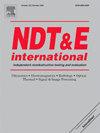基于无损检测、物理模型和机器学习工具的现有大坝结构健康评估
IF 4.1
2区 材料科学
Q1 MATERIALS SCIENCE, CHARACTERIZATION & TESTING
引用次数: 0
摘要
大坝的安全运行离不开监测系统,这些系统定期收集有关环境条件(如温度和水位)以及结构对外部作用反应的信息。在新建或改造的设施中,大型传感器网络可以每天进行测量,并自动传输到服务器。在其他情况下,可以通过新兴的无人机非接触式全场技术,偶尔或系统性地获取额外信息。测量结果由各种分析和机器学习工具根据历史数据集进行处理,能够突出显示任何异常记录。监测数据还可支持对基于物理的结构模型进行精确校准,该模型通常在有限元框架内构建。通过数字孪生进行的分析,可以扩展实验数据库,在极端环境条件、损坏或从未出现过的坍塌机制情况下对位移进行评估。本文特别关注模型校准程序和影响连接特性的不确定性。作者对基准问题和实际问题的验证研究结果突出了数据利用和远程测量替代方法的优点和局限性。本文章由计算机程序翻译,如有差异,请以英文原文为准。
Structural health assessment of existing dams based on non-destructive testing, physics-based models and machine learning tools
The safe operation of dams is ensured by monitoring systems that collect periodic information on environmental conditions (for example, temperature and water level) and on the structural response to external actions. In newly built or retrofitted facilities, large networks of sensors can take daily measurements that are automatically transferred to servers. In other cases, additional information can be acquired, occasionally or systematically, through emerging drone-based non-contact full-field techniques.
The measurements are processed by various analytical and machine learning tools trained on historical data sets, capable of highlighting any anomalous recordings. Monitoring data can also support the accurate calibration of a physics-based model of the structure, usually built in the finite element framework. The analyses carried out by the digital twin allow the experimental database to be expanded with the displacements evaluated in the event of extreme environmental conditions, damage or collapse mechanisms never occurred before.
This contribution illustrates an integrated approach to the safety assessment of existing dams that combines experimental, computational and data processing methodologies. Attention is particularly focused on model calibration procedures and on the uncertainties that influence the characteristics of the joints. The presented results of the validation studies performed by the Authors on benchmark and real-scale problems highlight the merits and limitations of alternative approaches to data exploitation and remote measurement.
求助全文
通过发布文献求助,成功后即可免费获取论文全文。
去求助
来源期刊

Ndt & E International
工程技术-材料科学:表征与测试
CiteScore
7.20
自引率
9.50%
发文量
121
审稿时长
55 days
期刊介绍:
NDT&E international publishes peer-reviewed results of original research and development in all categories of the fields of nondestructive testing and evaluation including ultrasonics, electromagnetics, radiography, optical and thermal methods. In addition to traditional NDE topics, the emerging technology area of inspection of civil structures and materials is also emphasized. The journal publishes original papers on research and development of new inspection techniques and methods, as well as on novel and innovative applications of established methods. Papers on NDE sensors and their applications both for inspection and process control, as well as papers describing novel NDE systems for structural health monitoring and their performance in industrial settings are also considered. Other regular features include international news, new equipment and a calendar of forthcoming worldwide meetings. This journal is listed in Current Contents.
 求助内容:
求助内容: 应助结果提醒方式:
应助结果提醒方式:


